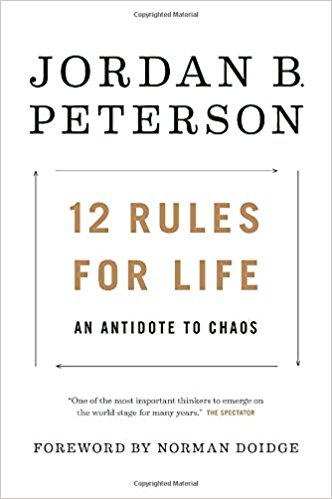 |
| https://www.amazon.com/12-Rules-Life-Antidote-Chaos/dp/0345816021/ref=sr_1_1?ie=UTF8&qid=1532802559&sr=8-1&keywords=antidote+for+chaos&dpID=412z30W2N-L&preST=_SY344_BO1,204,203,200_QL70_&dpSrc=srch |
Despite the self-help-y title of the name, it actually is a fairly interesting read, especially from a Christian perspective.
It is better read as the attempt by a doctor to quantify and summate his observations over many years of clinical practice rather than something he postulates for the purposes of publishing.
As detailed in the foreward, each rule was initially posted online until a publisher asked him to take each "rule" and expand upon it. He discovered that he had a lot more to say on each one, and developed an essay for them, going into the history of that observance, relative academic work, his own clinical experiences, etc.
There is a fair amount of religious imagery in the book, most (but not all) coming from the Bible. In those instances, he pulls a number of things together that I thought were interesting:
- He weaves a narrative that, even if the Bible isn't true, it has been the core document responsible for western civilization, which, in turn, has, in a relatively short amount of time, advanced mankind from mostly abject poverty, to levels of freedom that are unprecedented, and luxury that even kings a hundred years ago couldn't conceive of. As the core document, the instruction contained within the Bible must be of vital importance for societal cohesion, and the truth for living has to be examined to determine why.
- Living a life without the idea of God justifies horrors inflicted on one another in a grand scale. He uses the Columbine shooting as a case study several times. Evidently, one of the shooters tried to write out why he felt the way he did before committing the heinous act. Pastors have been using those writings for years to warn against spiritual collapse. However, when the book views it through a psychological eye, then pairs up with a psychological view of the Bible, the results are sometimes bone-chilling.
- The psychology of the people of the Bible. We think of them mostly as 2D characters, there for a simple spiritual lesson in light of Jesus, then disposed of. The exploration as to the psychology of their experiences in terms of the Bible, the correction/path change in the Bible, then the circumstances under which we conduct ourselves today was illuminating. Of interest was the close examination of Cain and Abel. One of the things that was particularly illuminating was the need for self-reflection upon failure due to insufficiency. Cain's inability to do so led him to blame outside factors, and take "revenge" upon God by killing Abel. The psychology behind such actions is still with us today, and the book brings it out in vivid detail.
- The need for Biblical sacrifice, wisdom and living, even in absence of the Bible as a divine document. This was a hard thing for me to deal with. It almost seems like Dr. Peterson (who, by his own account, hasn't made up his mind on the existence of God, but "acts like God exists"), is offering a substitute of Biblical wisdom for those that reject the Bible as the inerrant Word of God. One part of me thinks that this allows people to reap the benefits of living a principled, Godly life without being saved. However, the other wonders if this might be a gateway to get people in a Biblical frame of mind. I haven't resolved this yet.
- Each chapter has a somewhat curious title that he explains, but he goes into Jack-Hayford level of background to get around to explaining the meaning (those from CoTW know what that means). The stories are at times interesting, tragic, playful, funny, and insightful. Usually a mix.
However, after listening to it, particularly with his emphases being read by the author himself, you realize that his only drive is to get to the truth of a situation. He's extremely clinical about almost everything he approaches.
I would recommend this book, not as a "it is truth, and you must adhere to what it says", but from a "it will at times reinforce or challenge what you think" standpoint.